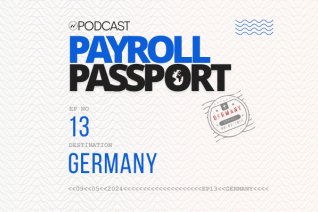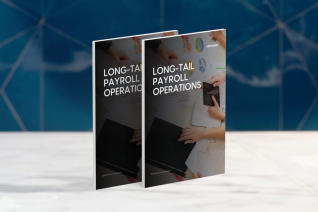Establish your presence around the world with Neeyamo as we help you go beyond borders to manage your international global payroll and hire new talent in Germany.
Overview
As of the end of 2022, Germany solidified its position as the largest economy within the European Union, boasting an estimated GDP of $4.504 trillion. This economic powerhouse is particularly dominant in the automotive sector, which significantly bolsters its GDP. In addition to its substantial role in the global automotive industry, Germany stands out for its exceptionally skilled and adaptable workforce.
Do your organization’s expansion plans require you to hire employees in Germany? Do you lack a physical entity in the country – a key requisite to hire local talent? Neeyamo assists organizations worldwide with onboarding and managing employees in Germany-processing payroll, managing local compliance requirements, benefits, and more.
Our Presence
Tools And Instances
Facts And Stats
Capital
Berlin
Currency
Euro
Official Language
German
Fiscal Year
1 January - 31 December
Date Format
DD/MM/YYYY
Country Calling Code
+49
Time Zone
Central European Summer Time (GMT +2)
Global Payroll
Overview
What is Payroll?
Global payroll is the management of the entire payroll function of an organization across all countries of operation. Organizations use a single solution capable of doing this from one central location.
What is a Payroll Compliance Practitioner?
A Payroll Compliance Practitioner is a specialized professional entrusted with the responsibility of ensuring the alignment of an organization's payroll procedures and protocols with pertinent laws, regulations, and established standards.
Global Payroll Solution
Handling payroll for a widespread workforce can pose a significant challenge for any organization, and the added complication of compliance can make things worse. If companies spend more time processing payroll, it directly impacts day-to-day operations and their overall productivity.
Over the years, with the help of our payroll compliance practitioners, Neeyamo has observed these complexities and strived to provide global payroll solutions through a single technology platform - Neeyamo Payroll. Neeyamo's global payroll services ease the process for companies looking to outsource their global payroll requirements and aid them in maneuvering the tricky payroll system in Germany.
Payroll Taxes
Payroll tax is the percentage amount retained from an employee's salary and paid to the government to invest in the general population's welfare. These are statutory in nature and are levied from both the employer and employee. Additional statutory contributions are made by employers towards aiding both short-term and long-term benefits for their employees.
Employee Taxes
The following are the employee contributions:
| Health insurance (KV) | 7.90% |
| TK-specific supplementary contribution rate | 0.6% |
| Pension Insurance (RV) | 9.30% |
| Unemployment Insurance (AV) | 1.20% |
| Long-term care insurance (PV) | 1.525% |
| Church Tax | 0% to 9% |
| Total employee cost | 22.05% - 31.05% |
Here is the income tax rates for single taxpayers in Germany:
| Up to 10,908 | 00% |
| 10,908 - 62,809 | 14-42% |
| 62,809 - 277,825 | 42% |
| 277,825 and above | 45% |
Here is the income tax rates for married taxpayers in Germany:
| Up to 21,816 | 00% |
| 21,816 - 125,618 | 14-42% |
| 125,618 - 555,650 | 42% |
| 555,650 and above | 45% |
Employer Taxes
Employer contributions are as follows:
- Health insurance (KV) - 7.90%
- TK-specific supplementary contribution rate- 0.60%
- Pension Insurance (RV)- 9.30%
- Unemployment Insurance (AV)- 1.20%
- Long-term care insurance (PV)- 1.525%
- Insolvency Charge- 0.15%
- Total Employment Cost – 20.645%
Payroll Cycle
Overview
Undoubtedly, payroll is a critical process for any organization. Pay cycle in Germany refers to the period for which an organization pays its employees, and this can vary depending on the pay frequency that the organization chooses to adopt.
Frequency
In Germany, employees are paid on a monthly basis.
13th Month Cycle
According to German Law it is not mandatory to pay 13th and 14th month bonus. It depends upon employment contract or collective bargaining agreement. If it is mentioned that you are entitled on a 13th month bonus, then it is proportionately entitled.
Global Work
Overview
An Employer of Record (EOR) service provider helps you eliminate the hassle of handling complexities while onboarding a new employee in an international location. They help bridge the gap that otherwise mandates organizations to have a local registered entity and a local bank account, prior to making a job offer to an international hire.
An EOR service provider acts as a legal employer, facilitates salary payments, and manages other statutory requirements such as health insurance, payroll taxes, and employee benefits ensuring compliance with local tax laws and regulations.
This allows organizations to focus on collaborating with the employee in Germany for operational tasks, with the knowledge that they have a cost-effective solution support their global payroll and HR requirements, as they continue their global expansion.
HR Mandates and Practices
Minimum Wage
Effective January 1, 2025, Germany’s statutory minimum wage has increased from €12.41 per hour to €12.82 per hour. The statutory minimum wage is designed to protect employees from unfair wages and ensure a minimum standard of income.
Overtime
Overtime work must conform to the maximum working hours stipulated within the employee contract/collective agreement. There are two common types of overtime; Mehrarbeit, which refers to working time that exceeds the maximum limit of 48 hours per week (8 hours per day across a 6-day working week), as set out in the Working Hours Act. This may be extended up to 10 hours per day if the employee’s total working hours average at 8 hours per day over six months. The second, Überstunden, which is defined as any hours worked on top of one’s contractually agreed hours, is legally permissible and must normally be compensated.
Data Retention Policy
In Germany data of an employee is kept for six years.
Withholding formula updates for 2023
With effect from April 1, 2023, the annual allowable deduction for employee expenses is increased to 1,230 Euros. The tax credit for single parents is increased to 4,260 Euros.
Hiring and Onboarding Requirements
Hiring
- Application - A written job application consists of a cover letter, curriculum vitae (CV) and copies of the most important certificates and references. In Germany, it usually still includes a photo. It is important that all documents are of high quality, as the application should make a good first impression. Online application is also common. The Cover letter provides the prospective employer with information about employee’s qualification. It should state your interest in job and why one considers himself best for the job.
- Interview - An employer should refrain from asking certain questions for instance a female employee cannot be asked whether she is pregnant. The employer should refrain from asking questions related to race, ethnic origin, gender, religion, disability, age or sexual identity. Such questions could be seen as a violation of the General Equal Treatment Act. However, some of these questions may be permitted if they constitute a job requirement. Applicants may be asked about criminal record.
- CV - It contains their contact information, personal information as well as a professional profile. In Germany it is a common practice to add photo in the cv it is not mandatory but it’s a common practice.
Onboarding
Following are the key parts required under the employee induction programme are:
- Meet colleagues.
- induction processes should cover practical information about organizational procedures (such as building orientation, health and safety.
- Information about systems and procedures, company strategy and services such as company values, strategy, and products and services. Explain the responsibility of their new role.
- Get all the necessary documents sorted
Onboarding document checklist and employee persona data
- Personal related documents - Official certificate of good conduct, copy of job references, Residence permit / work permit, Letter of application, Professional diploma, Vocational training, professional development, Curriculum vitae, Personal Skills, Passport photo, School leaving certificate, educational degree certificate.
- Contract related documents - Employment Contract, Declaration on secondary employment, Job description.
- Social Security documents - Registration for health insurance, Proof of long-term care insurance, Proof of health insurance contributions, Proof of long-term care insurance, social security card, Documents for supplementary benefits.
- Tax documents - Salary Slips, pay slips, wage tax documents, Proof of capital formation services.
- Documents necessary for the salary are relevant - Application for child benefit, Children's birth certificates, Marriage certificate, Death certificate of the spouse, Capital accumulation benefits.
- Copy of official documents - Driving license, Divorce decree, Military service certificate, Certificate of Civil Service, Attachment and Transfer Order.
- Occupational Safety document - Assessments, Admonitions, Health Certificate, Absenteeism.
- other documents- Work Report, Certificate of medical examinations.
Probation
Employee must usually expect a probationary period of three to six months, during which time he or she can be dismissed with two weeks' notice.
Leave
National Holidays
German holidays differ based on the state. There are 9 national holidays that all state follows.
- Jan 1: New Year
- Apr 7: Good Friday
- Apr 10: Easter Monday
- May 1: Labor Day
- May 18: Ascension Day
- May 29: Whit Monday
- Oct 3: German Unity Day
- Dec 25: Christmas Day
- Dec 26: Boxing Day
Sick Leave
Eligible employees (those who have been employed for four weeks before starting sick leave) are entitled to sick pay of 100.00% of the regular income for up to six weeks. After six weeks, the health insurance fund pays between 70.00% and 90.00% of the regular salary, based on the insured employee’s fund level, for up to 78 weeks in three years for incapacity caused by the same illness, calculated from the first day of sickness. The employee must inform the employer of their incapacity for work and the anticipated duration of the incapacity as soon as possible. If an illness lasts longer than three days, an employee must submit a doctor’s certificate no later than the following working day.
Maternity Leave
A pregnant employee is entitled to 14 weeks of paid maternity leave, which can increase to 18 weeks with complicated/multiple births. Maternity leave consists of two periods; Prenatal leave, which requires the employee to take a minimum of 6 weeks before the expected due date, and Postnatal leave, which requires an employee to take the remaining eight weeks of leave which starts from the date of the birth of the child. The public health insurance fund pays the maternity payment. The payment is equivalent to the average sum of the net wages for the three months before the pregnancy paid by the employee’s public health insurance.
New Staggered Maternity Protection Periods
- 2 weeks from the 13th week of pregnancy.
- 6 weeks from the 17th week of pregnancy.
- 8 weeks from the 20th week of pregnancy.
- Currently, women who miscarry before the 24th week receive no statutory maternity protection. The amendment removes the previous 500-gram weight limit as a criterion for maternity leave eligibility.
Paternity Leave
Fathers are entitled to 5 days of unpaid leave at the time of the birth or adoption of a child. Employees can also apply to the Federal Government scheme for additional leave.
Parental Leave
New parents are legally entitled to unpaid parental leave and must request the leave in writing at least seven weeks before the start date. Parental leave is 36 months (including the eight weeks of postnatal leave) and can be shared between the parents. However, the parents must take at least 12 months of parental leave within the first three years the remainder, with permission from the employer, can be used at any point between the child’s second and seventh birthday. Parents can also choose to work part-time up to 30 hours per week with prior permission from the employer during parental leave
Other Leave
- Annual Leave - The statutory minimum entitlement of annual leave is 24 working days per year set out by the Federal Holidays Act. Many Collective agreements increase this entitlement to 30 working days, and employees that work in dangerous or high-risk environments are often entitled to additional leave.
- Force Majeure Leave - Employees can take 3-5 days to deal with urgent family matters within a year while receiving their regular pay.
- Bereavement Leave - Two days is usually given for mourning and funeral for a close relative, but specifics should be written in the employment contract.
- Work-related Injury - Work injuries are covered by statutory accident insurance as part of the national social security and contributions are made according to income and risk assessment. The eave is compensated for the first six weeks of the injury.
- Family Care Time - It entitles an employee to up to 10 days unpaid leave to assist to a seriously ill family member or family emergency
Termination
Notice Period
Any notice of termination, whether issued by the employer or by the employee, must be made in writing in order and is to be served to the other party. Should the terminating party fail to comply with this requirement as to the written form, the notice of termination is invalid. The statutory notice period for employees is four weeks prior to either the 15th or the last day of the next month. The statutory notice period for employers depends on how long the employee to be terminated has been working for the company.
- If an employee has worked for 2 years employed: 1-month notice period taking effect at the end of a month.
- If an employee has worked for 5 years employed: 2-month notice period taking effect at the end of a month.
- If an employee has worked for 8 years employed: 3-month notice period taking effect at the end of a month.
- If an employee has worked for 10 years employed: 4-month notice period taking effect at the end of a month.
- If an employee has worked for 12 years employed: a 5-month notice period takes effect at the end of a month.
Severance Pay
Severance payment is not mandatory if a justified reason and proper notice are given for termination. However, severance payment must be given for termination caused by operational changes.
When severance payment is given, it is a half month of the employee’s regular wage for every year the employee was in the company. There is no statutory severance in Germany. Employees are usually only entitled to severance payments under collective bargaining agreements. In practice, however, employers often compensate dismissed employees to avoid protracted negotiations over dismissals. The severance payment is usually around 50% of the monthly salary per year you have worked at the company. Severance pay can vary depending on the employee.
Visa
Overview
Depending on level of qualification types of visa are listed below:
- Visa for skilled workers with academic training
- Visa for skilled workers with vocational training
- Visa for IT specialists without formal degree
Once the international skilled worker has arrived in Germany, they have to apply for a residence permit. It is issued by the Foreigners' Authority along with the permit to take up employment. An entry visa always serves a specific purpose. When applying for a visa, the correct intended purpose of stay must be stated. Entry for touristic purposes (Schengen visa) does generally not entitle its holder to take up employment in Germany and prohibits the issuance of a residence permit for the purpose of employment.
Employee Background Checks
Legal and Background Checks
Germany currently contains no specific legislation regarding background checks. However, statutory constraints do exist pertaining to the attainment and storage of personal data. Employers must stay within their rights and limitations outlined by the German Equal Treatment Act (AGG), the German Data Protection Act, and the personality rights of each applicant protected under the German Civil Code. Background checks in Germany rely most heavily on the principle of direct acquisition of data via the applicant.
Last updated on April 22, 2025.
If you have any queries or suggestions, reach out to us at irene.jones@neeyamo.com
Have Queries? Get In Touch With Us
Get in touch with one of our experts and take a quick demo of our services












